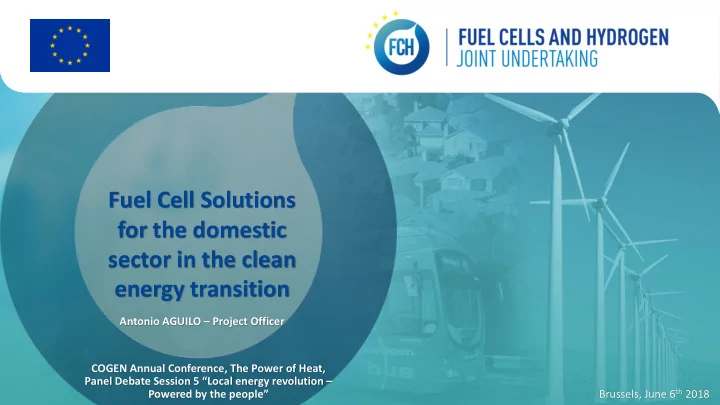

Fuel Cell Solutions for the domestic sector in the clean energy transition Antonio AGUILO – Project Officer COGEN Annual Conference, The Power of Heat, Panel Debate Session 5 “Local energy revolution – Brussels, June 6 th 2018 Powered by the people”
Strong public-private partnership with a focused objective EU Institutional Public-Private Partnership (IPPP) Fuel Cells & Hydrogen Joint Undertaking (FCH 2 JU) Industry grouping Research grouping More than 130 members over 60 members 50% SME To implement an optimal research and innovation programme to bring FCH technologies to the point of market readiness by 2020 2
Policy drivers for the decarbonisation of the building sector Energy efficiency, renewables and air quality CO 2 reduction Air quality ( Energy Efficiency / Renewables) Roadmap to a highly efficient and decarbonised building stock NZEB targets 2018-2020 More than 467.000 premature deaths were attributed to exposure to high concentrations of particulate matter in 2013 Source: Air quality in Europe — 2016 report. Link 3
What is fuel cell micro-cogeneration (micro-CHP)? Highly efficient distributed home and small business energy system that simultaneously produces heat and electricity H 2 grid/LPG/ natural gas grid , biogas/syngas grid Hydrogen Fuel cells are electrochemical devices and do not rely on combustion 4
Micro-CHP Fuel cells – Results of field trials The first EU wide field trial, ene.field, saw over 1 000 FCs micro-CHP units deployed by 2017 More than 3000 units deployed across EU Track record of installations Field trials results * ✓ Seasonal electrical AC efficiencies up to 60% ✓ Overall efficiencies as high as 85-95% ✓ 88% of all systems during first year of operation achieved >98.2% availability ✓ 10 years product lifetime offered *Source: 2017 FCH JU Data Collection ✓ Zero or negligible emissions in local air and Analysis Exercise, see also ✓ End-users satisfaction recorded https://goo.gl/GEqsoj and https://goo.gl/74Ffyc and Learnings ✓ 600 installers trained from the ene.field project https://goo.gl/s3TmCZ 5
Why is the EU supporting fuel cells Efficiency, renewables and air quality Energy Efficiency / Renewables Air quality • Fuel cells do not relay in combustion ▪ Most efficient use of natural gas at • Negligible/zero impact on local air domestic scale emission (NOx, SOx, PMs) ▪ CO2 savings 20-80% * • Silent operation • Ultimately fuel cells run on H 2 which can be obtained from H 2 produced Security and flexibility of power with RES, biogas or RES syngas -> zero supply carbon solution • Can modulate power output with ease • Large number of units operating as *Source: Advancing Europe Energy Systems: stationary fuel single aggregated source of generation cells in distributed generation. Prepared by Roland Berger for the FCH JU https://goo.gl/Wq7P4R • Electricity produced close to demand • Demand response potential capability 6
Aguilo-Rullan Antonio Antonio.Aguilo-Rullan@fch.europa.eu For further information www.fch.europa.eu @fch_ju www.hydrogeneurope.eu www.nerghy.eu Fch-ju@fch.europa.eu FCH JU
Recommend
More recommend